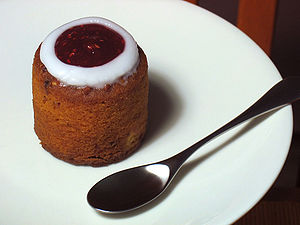Search results for "jarkko/2011/04/matti-suurpaa-parnasso-1951–2011-parnasso-1951–2011/2009/09/what-god-said/2010/02/let-us-eat-cake/page/68/www.booksfromfinland.fi/1996/2009/09/what-god-said"
Matti Suurpää: Parnasso 1951–2011 [Parnasso, 1951–2011]
21 April 2011 | Mini reviews, Reviews
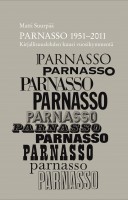 Parnasso 1951–2011. Kirjallisuuslehden kuusi vuosikymmentä.
Parnasso 1951–2011. Kirjallisuuslehden kuusi vuosikymmentä.
[Parnasso, 1951–2011. Six decades of a literary journal]
Helsinki: Otava, 2011. 559 p., ill.
ISBN 978-951-1-23368-8
€ 45.90, hardback
The 60-year history of Parnasso, Finland’s longest-running literary journal, is a chronicle of the assimilation of ‘the modern’ into Finnish literature. Matti Suurpää – a long-time contributor, and former head of the SKS publishing house – singles out the 1958–1965 period under the editorship of Kai Laitinen (professor of literature, Editor-in-Chief of Books from Finland from 1976 to 1990) as the era with the broadest editorial scope. Finnish modernist literature, developed during the 1950s, had by then staked out its territory, and the journal consolidated its power to promote it. Laitinen published an excellent themed issue on Finland-Swedish literature to rehabilitate and reintegrate writing by Swedish-speaking authors into the field of Finnish literature. Subsequent editors considered it important to include translations of foreign literature in Parnasso. As the archives of the journal have been lost, Suurpää carried out a close reading of the annual volumes. The result is an eminently clear and readable work in which a wealth of extracts of writing and discussions illuminate the story of the modernisation of Finnish literature.
Translated by Ruth Urbom
Jarkko Laine Prize 2011
1 June 2011 | In the news
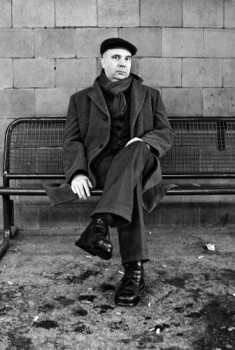
Juha Kulmala. Photo: Lotta Djupsund
The Jarkko Laine Literary Prize (see our news from 6 May), worth €10,000, was awarded to Juha Kulmala (born 1962) on 19 May for his collection of poems entitled Emme ole dodo (‘We are not dodo’, Savukeidas, 2009).
The prize is awarded to a ‘challenging new literary work’ published during the previous two years. Shortlisted were also two novels, Kristina Carlson’s Herra Darwinin puutarhuri (‘Mr Darwin’s gardener’, Otava, 2009) and Erik Wahlström’s Flugtämjaren (‘Fly tamer’, Finnish translation Kärpäsenkesyttäjä, Schildts, 2010).
Jarkko Laine (1947–2006) was a poet, writer, playwright, translator, long-time editor of the literary journal Parnasso and chair of the Finnish Writers’s Union.
The engineer’s story
30 June 1981 | Archives online, Fiction, Prose
A short story from Maailman kivisin paikka (‘The stoniest place in the world’, 1980). Introduction by Pekka Tarkka
Coffee was going to be served down by the river. The engineer took my elbow and led me across his paved courtyard and over his lawn; we settled ourselves down in cane chairs under the trees. Mirja came out of the house with a tray of coffee and coffee-cups, a loaf of sweet bread, already cut, some marble cake and some biscuits. The engineer said nothing. My eye wandered over the ample weeping birches by the river, the mist creeping up in the cool of the evening and shifting in the cross-pull of the breeze and the current, and I watched Mirja moving under the trees back to the house and then down again to the riverbank.
As we sipped our coffee we spoke about chance, and the part it plays in life, about my husband – for I was able to speak about him now: enough time had gone by. The engineer eased himself into a comfortable position, gave me a quick look and then launched off into an account of his own, about his trip abroad:
I spotted the news item as I was going through the morning paper on the plane. I sat more or less speechless all of the first leg, listening to Kirsti and her husband confabulating. I didn’t say anything during the stop-over in Copenhagen, either, where they wanted to get some schnapps and, of course, some chocolate ‘if Kirsti would really like some’. We came rushing back into the plane just as the last English, German and Danish announcements were coming over, and then we sat waiting for the take-off. That was delayed too because of a check-up (not announced), and then we were off again for Zurich, me without a word and they whispering together. Then it was the bus as far as the terminal, and after that a taxi to the hotel. Quite clearly Kirsti hadn’t heard a thing about it yet, and probably hadn’t had much contact with Erkki for quite some time, her new husband even less. More…
Let us eat cake
4 February 2010 | This 'n' that
Here at Books from Finland central we’re celebrating, with the one Finnish literary anniversary that involves its own dedicated cake.
The fifth of February marks the birthday of the poet J.L. Runeberg (1804–1877) – writer, among many other things, of the Finnish national anthem (actually unofficial, as there’s no mention of such a thing in the legislation), which he wrote in Swedish, Vårt land (in Finnish, Maamme). More…
Being God
30 September 2006 | Fiction, Prose
Extracts from the novel Gud (‘God’, Schildts, 2006)
Side by side, wolves and antelopes graze on the juicy grass.
A deer playfully chases a lion through the bushes.
‘Can you do this?’
Adam crosses his arms in front of his chest and folds his hands back to front so that the right hand is on the left and the left hand is on the right. With his hands folded he twists them downwards and holds them out. Now they point to Eve, still folded, and still with the right hand on the left.
Eve tries. She succeeds, and laughs with delight.
A gentle breeze is blowing from the east, just strongly enough for the couple not to be troubled by the heat, but not so they would feel the need for clothes to keep them warm. More…
The way to heaven
30 June 1996 | Archives online, Fiction
Extracts from the novel Pyhiesi yhteyteen (‘Numbered among your saints’, WSOY, 1995). Interview with Jari Tervo by Jari Tervo
The wind sighs. The sound comes about when a cloud drives through a tree. I hear birds, as a young girl I could identify the species from the song; now I can no longer see them properly, and hear only distant song. Whether sparrow, titmouse or lark. Exact names, too, tend to disappear. Sometimes, in the old people’s home, I find myself staring at my food, what it is served on, and can’t get the name into my head. The sun came to my grandson’s funeral. It rose from the grave into which my little Marzipan will be lowered. I don’t remember what the weather did when my husband was buried.
A plate. Food is served on a plate. There are deep plates and shallow plates; soups are ladled into the deep ones. More…
Lauri Timonen: Lähikuvassa Matti Pellonpää [Matti Pellonpää in closeup]
16 July 2009 | Mini reviews, Reviews
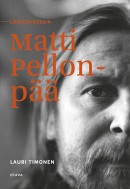 Lähikuvassa Matti Pellonpää
Lähikuvassa Matti Pellonpää
[Matti Pellonpää in close-up]
Helsinki: Otava, 2009. 335 p., ill.
ISBN 978-951-1-22903-2
€ 25, hardback
Matti Pellonpää (1951–1995) was one of the trusted actors, almost a trademark, of the film director Aki Kaurismäki. In 1993 he won the Felix Prize for best European male actor at the Berlin Film Festival for his role in La Vie de Bohéme. With his characteristic restrained empathy Pellonpää mostly played bohemians, unemployed people and outcasts. This portrait is built on the recollections of his friends and colleagues, as well as on the interviews by the author. These conversations deal with Pellonpää’s theatrical career and the musical experiments of his highly original band, Peltsix. The actor spent most of his free time in restaurants, where he eavesdropped on table talk and watched the eccentric personalities he encountered; the reader is also offered a sample of Pellonpää anecdotes.
Tellervo Krogerus: Sanottu. Tehty. Matti Kuusen elämä 1914–1998. [Said. Done. The life of Matti Kuusi, 1914–1998]
22 May 2014 | Mini reviews, Reviews
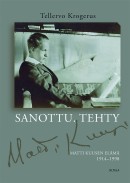 Sanottu. Tehty. Matti Kuusen elämä 1914–1998
Sanottu. Tehty. Matti Kuusen elämä 1914–1998
[Said. Done. The life of Matti Kuusi, 1914–1998]
Helsinki: Siltala , 2014. 856 pp., ill .
ISBN 978-952-234-194-5
€31.50, hardback
The folklorist Matti Kuusi vied for the status of the world’s leading researcher of proverbs with the Californian scholar Archer Taylor, his work extending from the shores of the Baltic Sea to Namibia’s Ovamboland. Proverbs revealed to him the deep structures of the human mind and showed that the nations of the world possessed a basis for mutual understanding. As a young man Kuusi read Spengler and predicted the destruction of the Western world. According to his ‘Kalevalan imperialism’, the Nordic region was to be the new world power. The war brought him to his senses: he understood that patriotism was mainly a matter of bland resilience. Professor Kuusi was a rigorous scholar, but also a provocative man of ideas who showed that pop music was today’s folk poetry. That idea received a mixed reception, but nowadays his department studies both rap music and ancient folk song. This biography by Tellervo Krogerus creates a rich portrait of a complex personality.
Translated by David McDuff
Summer child
30 September 1988 | Archives online, Fiction, Prose
A short story from Resa med lätt bagage (‘Travelling light’, 1987). Introduction by Marianne Bargum
From the very beginning it was quite clear no one at Backen liked him, a thin gloomy child of eleven; he looked hungry somehow. The boy ought to have inspired a natural protective tenderness, but he didn’t at all. To some extent, it was his way of looking at them, or rather of observing them, a suspicious, penetrating look, anything but childish. And when he had finished looking, he commented in his own precocious way, and my goodness, what that child could wring out of himself.
It would have been easier to ignore if Elis had come from a poor home, but he hadn’t. His clothes and suitcase were sheer luxury, and his father’s car had dropped him off at the ferry. It had all been arranged over the phone. The Fredriksons had taken on a summer child out of the goodness of their hearts, and naturally for some compensation. Axel and Hanna had talked about it for a long time, about how town children needed fresh air and trees and water and healthy food. They had said all the usual things, until they had all been convinced that only one thing was left in order to do the right thing and feel at ease. Despite the fact that all the June work was upon them, many of the summer visitors’ boats were still on the slips, and the overhaul of some not even completed. More…
Des res
Extracts from the novel Juoksuhaudantie (‘The Trench Road’, WSOY, 2002)
Matti Virtanen
I belonged to that small group of men who were the first in this country to dedicate themselves to the home front and to women’s emancipation. I feel I can say this without boasting and without causing any bickering between the sexes.
A home veteran looks after all the housework and understands women. Throughout our marriage I have done everything that our fathers did not. I did the laundry, cooked the food, cleaned the flat, I gave her time to herself and protected the family from society. For hours on end I listened to her work problems, her emotional ups and downs and her hopes for more varied displays of affection. I implemented comprehensive strategies to free her from the cooker. I was always ready with provisions when she got home exhausted after a day at work. More…
Jarkko Nieminen: Pelaamisen lumo [The fascination of the game]
20 August 2009 | Mini reviews, Reviews
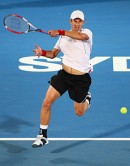 Pelaamisen lumo [The fascination of the game]
Pelaamisen lumo [The fascination of the game]
Helsinki: Avain, 2009. 175 p., ill.
978-952-5524-69-7
€ 38, hardback
Tennis is a curious game, as everyone who plays it knows – and even those who don’t, which is why it is such a popular sport. Although Jarkko Nieminen (born 1981), a professional player since 2000, has not yet won a Grand Slam event for Finland, in 2006 he was ranked no. 13. (Unfortunately, this spring Nieminen injured his wrist and missed the top matches of the season.) In this book (edited and published by his sister Anna-Riikka Carlson, who founded the publishing company Avain in 2003), Nieminen tells the story of his athletic career. ‘In Japan my visa said I was an “entertainer”,’ he recalls as he describes what it’s like to walk out on a court filled with thousands of spectators. Tennis is a gentleman’s game, a polite duel (or double), and Nieminen is certainly a gentleman par excellence. His personal story is designed to be strictly informative, as he chooses to keep his family life private, for example (his wife Anu, née Weckström, a Finnish multiple badminton champion, is referred to once). There is no doubt, though, that the reader will be convinced of Nieminen’s happy choice of an athletic profession.
Becoming father and daughter
31 December 1990 | Archives online, Fiction, Prose
A father kidnaps his 10-year-old daughter and flees to the western extremity of Europe, to Ireland, to begin a new life under new names. In the following extract, the girl is in a state of shock after witnessing an event organised by a religious sect in which animals are driven over a cliff to their death. The year 2000 approaches, and with it clarification of the relationship between father and daughter. An extract from Olli Jalonen’s novel Isäksi ja tyttäreksi (‘Becoming father and daughter’). Introduction by Erkka Lehtola
He begins leading his daughter back the way they came, along the hillside and the lip of the precipice.
The blare of the Legion’s display carries far, till finally the voices are scrambled in the bluster of the wind. The electricity crackles in the loudspeakers, and the thundersheets rumble out to the audience. ‘Be silent!’ come the roars from the plat form: ‘And look at each other! Each is fearfully following his way, each is a venue of good and evil, each is inscribed with God’s name!’ More…
Martin Panelius & Risto Santti & Jarkko S. Tuusvuori: Käsikirja [The hand book]
8 May 2014 | Mini reviews, Reviews
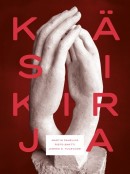 Käsikirja
Käsikirja
[Handbook]
Helsinki: Teos, 2013. 761 pp., ill .
ISBN 978-951-851-523-7
€37, hardback
Human development and human life are in many ways linked to the hand – and yet we seldom think about its significance. In their accessibly written and comprehensive Käsikirja, Emeritus Professors Martin Panelius and Risto Santti are joined by researcher Jarkko S. Tuusvuori in considering the body’s upper extremity from various points of view. The authors’ expertise in their own fields – neurology, anatomy and philosophy – set the book’s tone, but it goes far beyond these. The structure and functions of the hand are examined, as are its phylogeny, its neural networks, its aging process, its use in skills, and the injuries and illnesses that threaten it. The book deals with the hand’s connection with language and communication, its social significance, and the importance of human touch. There are a great many details, terms and names, but the artwork, the beautiful layout, the examples and the literary selections enliven the narrative. A multi-faceted achievement, Käsikirja is a refreshingly original work of non-fiction.
Translated by David McDuff
Animal crackers
30 June 2004 | Children's books, Fiction
Fables from the children’s book Gepardi katsoo peiliin (‘A cheetah looks into the mirror’, Tammi, 2003). Illustrations by Kirsi Neuvonen
Rhinoceros
 The rhinoceros was late. She went blundering along a green tunnel she’d thrashed through the jungle. On her way, she plucked a leaf or two between her lips and could herself hear the thundering of her own feet. Snakes’ tails flashed away from the branches and apes bounded out of the rhino’s path, screaming. The rhino had booked an afternoon appointment and the sun had already passed the zenith.
The rhinoceros was late. She went blundering along a green tunnel she’d thrashed through the jungle. On her way, she plucked a leaf or two between her lips and could herself hear the thundering of her own feet. Snakes’ tails flashed away from the branches and apes bounded out of the rhino’s path, screaming. The rhino had booked an afternoon appointment and the sun had already passed the zenith.
When the rhinoceros finally arrived at the beautician’s, the cosmetologist had already prepared her mud bath. The rhino was able to throw herself straight in, and mud went splattering all round the wide hollow. More…

